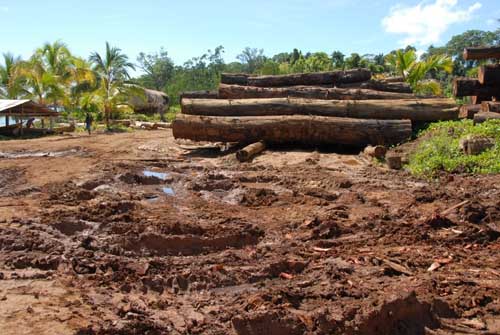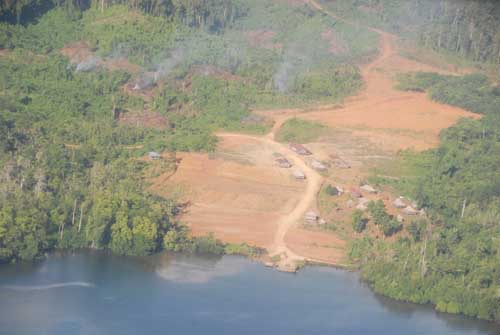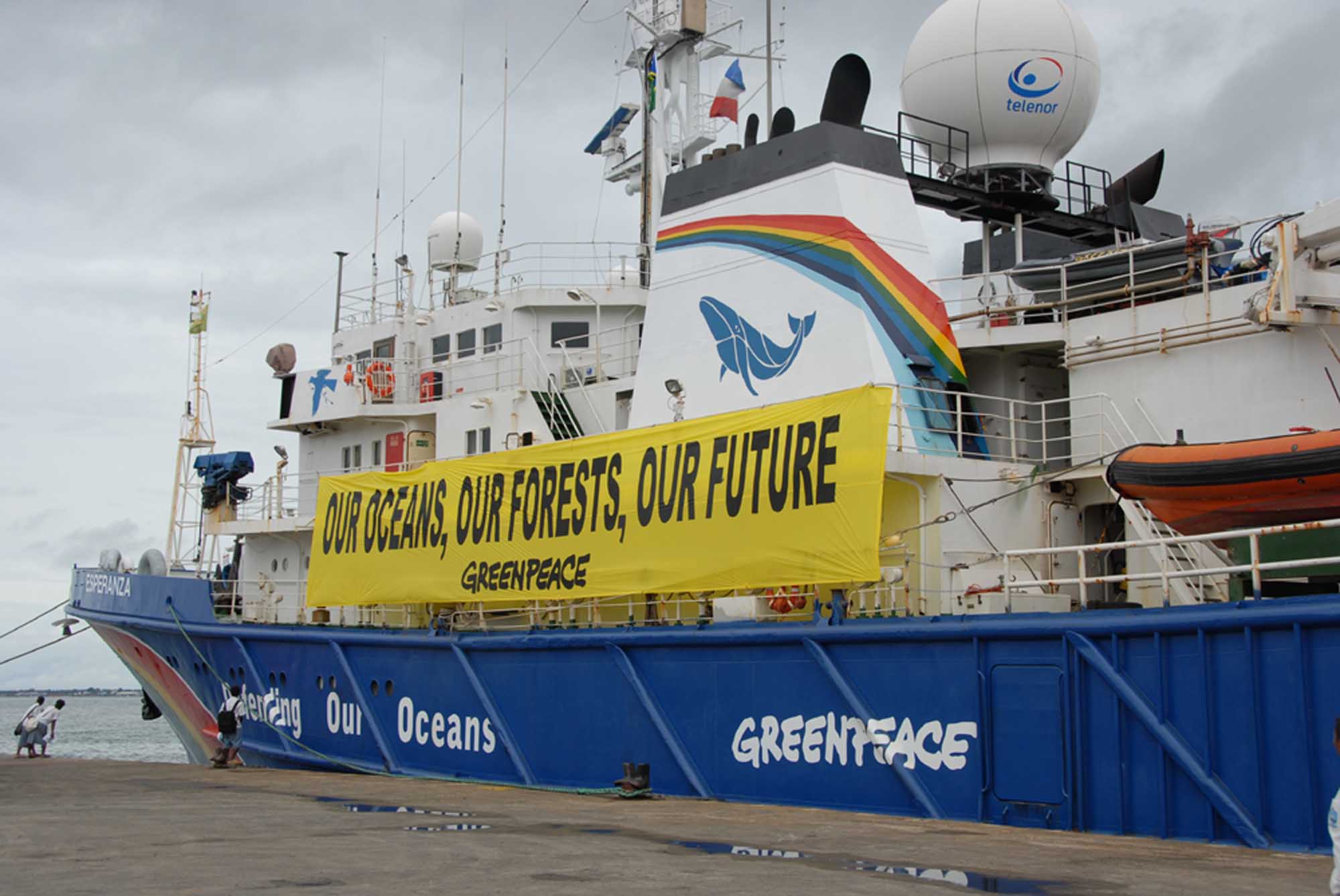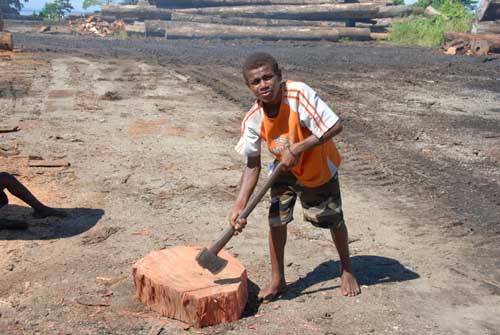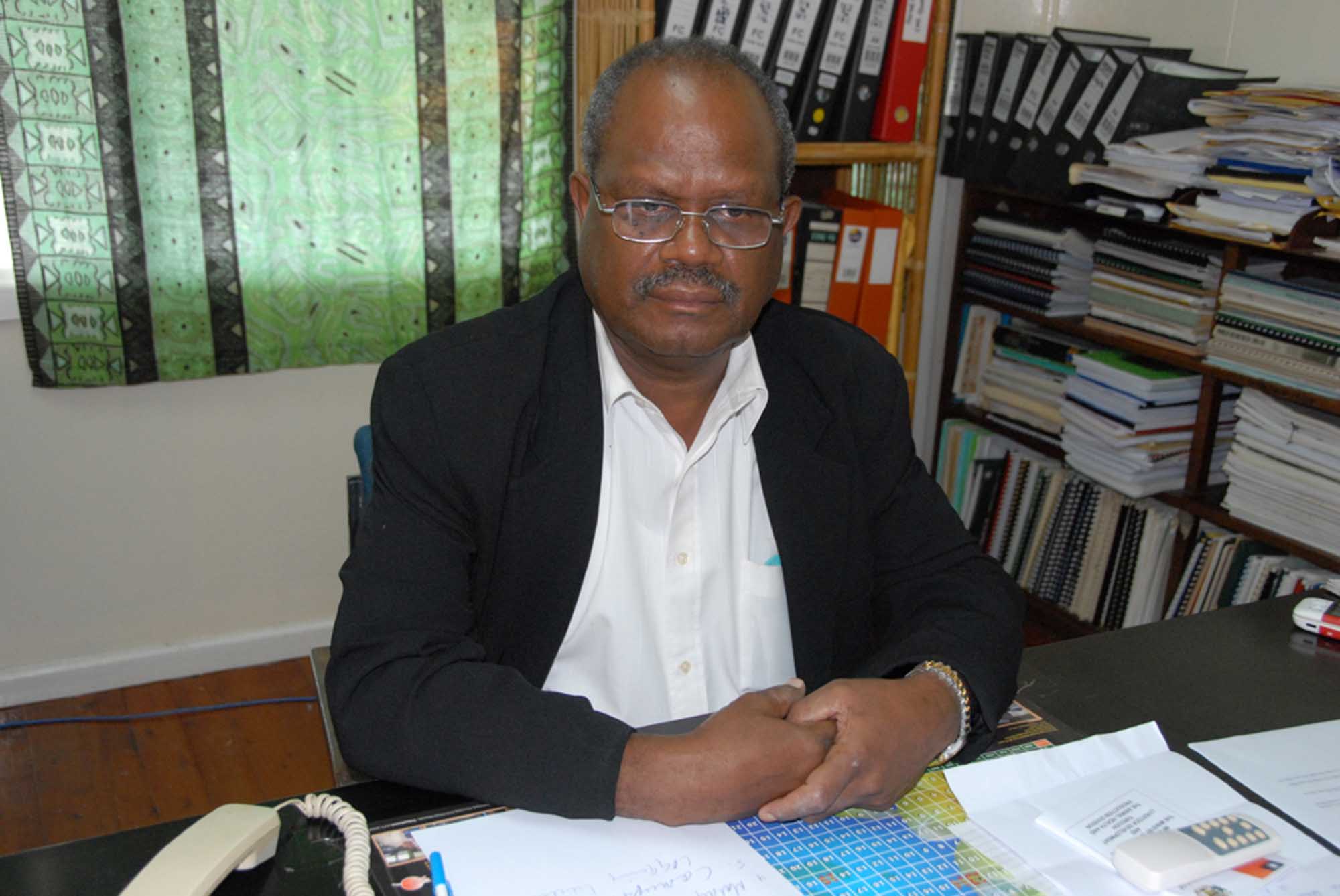New Orleans This is a preview of coming attractions. In a partnership with ACORN International we have joined with Andre Vltchek in an important project to resuscitate a critical website, Asiana News (www.asiananews.org), which will be debuting within days. The site was formerly called Asiana Press Agency and featured excellent articles from journalists and activists working in the countries from Japan, Korea, China, India, Indonesia, Australia, New Zealand, and many of the island chains around these areas. The photographs were beautiful and unique and the perspectives important from this important but virtually ignored part of the world.
As a teaser on the great content that the site will offer, I’m sharing below a piece that Andre recently ran in Japan Focus on the devastating impacts of logging in the Solomon Islands north of Australia. There will be a way to move from the ACORN International site to Asiana News, but you might want to bookmark this as well. It’s going to be important as it offers a new platform to voices from this region on work, change, and organizing in a part of the world that could finally gain more attention if there becomes an Obama presidency in the United States. Remember: www.asiananews.org!
A large fiberglass boat propelled by a 40HP engine speeds across the pristine waters of Marovo Lagoon, a double-barrier enclosed lagoon with hundreds of stunning islets. The area is on UNESCO’s provisional world heritage list. Having left Ramata, a small settlement almost at the Northwest extreme of the lagoon, it is heading for New Georgia Island, locally known as the “mainland” because of its size.
A few minutes after departure, dark stains appear on the surface of the otherwise crystal-clear water. “That’s from the logging”, explains the skipper, guiding the boat towards Gerasi Camp now clearly visible from the lagoon.
Red-brown gashes of exposed earth are cutting through luxuriant green tropical forest. Around noon, the heavy equipment is idle. Although some logging continues in the area, the forests around Gerasi are almost completely logged out.
Logging and the Environment
“Gerasi Vao Camp has had between 600 and 700 logs piled up, sitting near the jetty for 3 years”, explains Curren Rence, former government official, who now runs the local inn and is one of the elders of Ramata village. “Why did they cut down these trees, if they think they are not good for export? Local people got almost no money from these logs. And we have no idea what the government plans to do with them. They are rotting.”
Polluted water of Gerasi Camp penetrates the nearby mangrove area, creating brown streams on an otherwise spotless water surface. Old logging equipment and the Malaysian speedboat Putri Anggrek are rotting near the shore. Locals offer small coconuts to occasional visitors. When the clouds move away and a brutally hot sun begins to shine, oil spills become more visible on the surface, creating a stunning contrast to the see-through water of Marovo Lagoon.
“Logging still takes place upstream on the Niva River”, explains the skipper. “The Loggers use chemicals which are polluting both the river and the lagoon. It has devastating effects on animals. Crocodiles, who formerly coexisted peacefully with the local people, went mad from poisonous chemicals and the changing environment. They became unpredictable, moving between the islands, attacking people. One woman in our village recently lost her arm. The crocodiles in this area already killed at least 4 people. Our children from the other side of the lagoon commute to Ramata, to attend secondary school. They are paddling in small canoes. We see it as disaster in waiting.”
“Foreign, mainly Malaysian companies are coming to the government and to NNGTC (North New Georgia Timber Corporation”)”, continues Rence. “They use NNGTC as intermediary between them and landowners, to get access to customary land. Government doesn’t come here — it does nothing to control the process. People in the villages have no idea what’s going on. We already asked one RAMSI (Regional Assistance Mission to the Solomon Islands) advisor to pass the message to the government. We need government to take action. The nearest logging site has been in operation for the past 3 years, and the company has already sent away 4 shipments of timber. Last year they paid a meager 400,000 Solomon dollars (about US$50,000) — an amount that has to be divided between two local tribes. What happened to the rest of money?”
International organizations and local inhabitants agree that involvement of foreign, mainly Malaysian, companies belonging principally to the Kumpulan Emas Group, Rimbunan Hijau and Golden Springs International, and to a lesser extent Korean, logging companies had negative, often devastating, effects on tribal communities all over the Solomons. Environmental destruction arrives together with the culture of corruption. Entire cultural structures in rural tribal areas are collapsing.
Tim George, Special Coordinator of RAMSI, observed that “RAMSI remains very concerned about what is happening with logging in the Solomon Islands. Our concerns are threefold. One is the implication for the country of the current unsustainable rate of logging and the impact of the rapid decline in earnings from logging that is inevitable in the next three to five years as the commercially available trees are logged-out. The second is in the area of law and order. One of RAMSI’s primary goals was and remains to assist the Solomon Islands authorities to restore law and order and, as is common knowledge here, the logging industry is frequently raised as a sector which fails to comply with the principles of good governance. This is not just a question of simple legality; there are also the potentially costly environmental and social impacts that flow from operations taking place in remote areas that are very difficult to regulate or scrutinize. The third and most difficult concern is the impact that logging interests appear to have on political processes here. There have been some encouraging signs from the Sikua government. After several attempts by previous governments, the Sikua Government announced on 25 April that the price for logs that is used to calculate the revenue due to the government in duty on the export of logs, will increase on May 1 and that an authentic formula to keep it in line with world prices is to be put in place.”
Reports by the Ministry of Forests, Environment and Conservation (2006), the IMF (2007), and Greenpeace Australia Pacific offer an overview of the current problem: “The Solomon Islands has 2.8 million hectares of forests, covering around 85% of the total land area. However, only one fifth (600,000 ha) of the natural forest area is suitable for commercial logging, and all remaining large forest areas (over 50,000 ha) are in poorly accessible hill and mountain areas. The forest has been heavily exploited over the last two decades and current logging is out of control. Industrial logging in the Solomon Islands is dominated by foreign companies who, along with local front companies and contractors, landowner agents and middlemen, and a compliant government, have been logging at a rate that is four times the estimated ‘sustainable yield’, or the level of non-declining harvest. Many other reports and assessments have documented financial irregularities such as transfer pricing, misreporting and tax avoidance, serious environmental and social impact, and the fact that logging is economically less beneficial to local landowners than small-scale economic activity. The logging sector currently accounts for 67% of export receipts, 15% of domestic government revenue, and 15% of GDP. However the IMF recently predicted a rapid collapse of logging with commercial natural forests being logged out by 2014. The IMF, the Central Bank and the Governor General of the Solomon Islands have all warned of serious financial, economic and social impact when this happens. According to some forecasts, economic growth will decline to 1.5% per annum, down from 10% in 2007, largely due to a rapid decline in logging as commercial forests are logged out.”
From the speedboat, progressing southeast, more and more logging sites are visible from the water. Like scars, they cut through the greenery of tropical forest. One of the largest and most polluted belongs to the Malaysian company Golden Spring. There, white foam is hugging the shore and the water is unnaturally brown. From the pier, devastation extends towards the hills.
But it is not only large commercial logging that is scarring the islands around Marovo Lagoon. On hundreds of spots, native forests have given way to coconut plantations. “Tribal chiefs and religious leaders in this area decided that coconut trees had to be planted, and everyone had no choice but to follow”, explained the skipper, adding that there never seemed to be a real market for coconuts.
In Honiara, the nation’s capital, Aseri Yalangono, one of the CFC leaders and an employee of the Ministry of Education, explains: “Our community is eager to run re-forestation projects. It is true that we plant palm oil, but not only palm oil… also eucalyptus and mahogany and teak”.
“Oil palm plantations take a lot of chemicals”, says Grant Kelly, Australian owner of the legendary Uepi Island Resort located in one of the most picturesque parts of Marovo Lagoon. “Pesticides and herbicides have to be used. In the past, some people got very sick and had to be flown to the hospital in Honiara.”
The Social Impact of International Logging
People like Grant Kelly are naturally concerned about the environmental impact and the influence it would have on their tourism projects. But he also points to many terrible by-products of the logging: “Logging camps helped to create an atmosphere of lawlessness. There is fighting there, also prostitution of both boys and girls. Not to speak of alcoholism.”
Aseri Yalangono agrees: “There are no real benefits for the communities from the logging. Benefits come to only 1% of the population — those who are rich already. Logging companies come with huge bags of money; they often give community leaders 100,000 Solomon dollars (US$12.000). I never saw so much money in my entire life. But it probably represents only 1% of the amount that they will get from the logging operation. The situation is corrupting our girls: they go to the camps or they are shuttled to the fishing and timber boats from Honiara. There is prostitution, unwanted pregnancies. Malaysians sometimes take underage girls as second wives, abandoning them when it is time to return home. Many terrible things are happening.”
According to Greenpeace, “many serious social impacts resulting from logging have been documented over the last decade. These include: destruction of water sources and desecration of sacred and burial sites, child sexual abuse and prostitution, increased disputes and conflict within a community, the breakdown of social structures, and hardship resulting from the loss and damage to forest resources that local people rely on for their every day living.”
In Marovo Lagoon, most of the water is still transparent; its coral is of great beauty, often growing in fantastic profusion only a few feet below the surface. But it is much more than just a beautiful collection of snapshots. Marovo Lagoon is the largest salt-water lagoon in the world. It is inhabited by people who speak their own language and have their own history, culture and legends.
The person whom many believe to be responsible for many present problems — Minister for Forestry, Sir Allan Kemakeza — was Prime Minister of the Solomon Islands at a time when many dubious concessions were given to the logging companies.
Asked about the problems related to logging, he replied: “A big problem in the Solomon Islands is that resources are controlled by the land owners. What people want to do with their land and their trees, the government has no control over. It’s not like in other countries where the government owns the land. In the Solomon Islands, 85 to 90% of the land is customary; owned by the tribe or individuals.”
Logging, mining and fishing by foreign fleets brought several glaring problems to the Solomons, the most chilling being child prostitution and child pornography. Time Magazine ran a story “Sold and abused” on March 27, 2006, claiming that “… many visitors are sexually abusing the country’s children — and parents, politicians and police seem powerless to stop them.”
Sir Allan reminded me that, “in the Solomon Islands there is no age of consensus. With a lack of legal protection, there also seems to be an acute lack of will on the part of the government and police to tackle the problem. The problem is well known and documented. So are the departure points of the boats that are taking underage girls to foreign boats docked in the harbor. And the logging camps where abuse takes place.”
In 2006 when the Time Magazine report went to press, the Solomon Islands didn’t have a single patrol boat that could operate at night intercepting vessels that were taking children — girls and boys — to the fishing ships. Now it has two — high-tech and powerful ones. But they sit in the port, idle.
Not much was done even after publishing a comprehensive report “Commercial Sexual Exploitation of Children In The Solomon Islands: A Report Focusing on the Presence of the Logging Industry in a Remote Region” (A Report Prepared by Tania Herbert of the Christian Care Centre, Church of Melanesia, Solomon Islands, in July 2007). The report found:
“Child prostitution was the most prominent type of exploitation, with 25 stories collected, affecting 36 children. Children ranged from age 11 through to 19, with most children being aged 13 to 15 years. Most of the perpetrators were foreign loggers. There were 12 stories of children entering into early marriage or being ‘sold’ into marriage by parents. All but two cases were marriages to foreign loggers, and six stories were about girls below the legal age of 15. In addition, there were two cases where a child was at risk of being trafficked, or sold to be taken to another country. There was also a range of sexual abuse cases, with crimes being committed by both foreign and Solomon Islander men. Pregnancy of children was an issue, with nine stories of underage girls becoming pregnant. . . . There is little doubt that the presence of the logging company is a contributor to these abuse and exploitation cases with children”.
Ethnic Violence
The Solomon Islands are in profound crisis. Since 1998 ethnic violence, government misconduct and crime have undermined stability. In June 2003 an Australian-led multinational force, the Regional Assistance Mission to the Solomon Islands (RAMSI), arrived to restore peace and disarm ethnic militias. Although official count of loss of lives stands at hundreds, some influential figures, including high-level Catholic clergy claim that as many as 2,000 to 3,000 thousand people died in the conflict.
In April 2006, Chinese became the main target of protest riots triggered by rumors that Taiwan had paid for the election of the unpopular Snyder Rini as prime minister. Not distinguishing between Taiwanese and Chinese, the crowd was screaming “waku,” a derogatory expression meaning Asian or Chinese. The Chinatown in the country’s capital of Honiara was nearly leveled following looting and arson attacks. The Solomon Islands have no diplomatic relations with the PRC, as it recognizes Taiwan. Many victims were immigrants from mainland China, some having lived in the Solomon Islands for several generations.
Reconciliation is still a distant dream. Mistrust is dividing regions. Corruption is omnipresent. The economy is dependent on logging, mining and selling of fishing licenses. Several international organizations warn that over-logging, over-fishing and ecologically damaging mining may lead to environmental and economic disaster. Government officials are doing little to change the situation. Logging goes on, so does almost uncontrolled fishing of tuna. The mining industry is ready to move in to become the next to exploit this country, which ranks among the least developed nations in the world. There is gold and diamonds under the rolling hills of Solomon Islands; and there is nickel.
Before leaving Marovo Lagoon, Curren Rence takes me for a last spin around Ramata Island. Despite the pollution, there is still more beauty than ugliness. I recall the words of UNESCO science expert Hans Thulstrup: “even with the forests logged out, Marovo Lagoon deserves to be declared a world heritage site. It satisfies several requirements. Its several distinct ecosystems can be found above and under the surface of the sea.”
But just a few minutes from Ramata, I am shown the small Hapu-Hapu islet. “It sank half way after last year’s tsunami,” Curren explains. “Right here, there was a beautiful white sand beach. Now it is buried under the sea and you can only see mangrove. There are several islands like that in Marovo Lagoon. It is a direct result of global warning. And what is happening around here — indiscriminate logging — is adding to the problem.”
Locals explain: “We can’t expect anything from Honiara. And we don’t. But this time we really need help. Alone, we will not be able to stop the loggers and destruction that comes with them.
Andre Vltchek is a novelist, journalist, filmmaker, playwright, editorial director of Asiana Press Agency, cofounder of Mainstay Press, and a senior Fellow at The Oakland Institute. He is presently living and working in Asia and South Pacific and can be reached at: andre-wcn@usa.net.
A Japan Focus associate, he wrote this article and provided the photographs for Japan Focus. Posted on June 1, 2008.
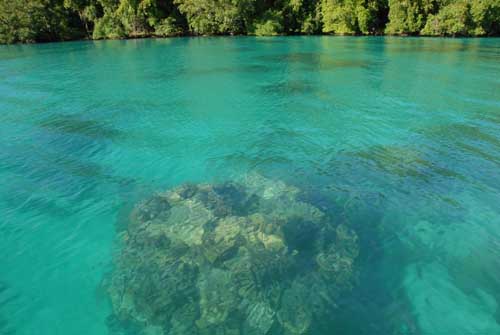
Marovo logged out
Marovo logged out and polluted-a view from the air
Esmeralda in Honiara
Child labor in Guadalcanal
Sir Allen-Minister of Forestry and Natural Resources and former PM
